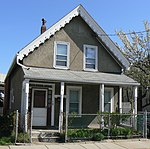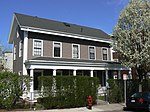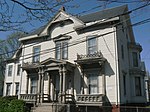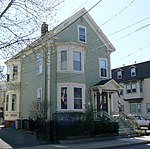Sullivan Square
Charlestown, BostonNeighborhoods in BostonSquares in BostonTransportation in Boston

Sullivan Square is a traffic circle located at the north end of the Charlestown neighborhood of Boston, Massachusetts. It is named after James Sullivan, an early 19th-century Governor of Massachusetts. Sullivan Square station on the MBTA Orange Line is located just west of the square.
Excerpt from the Wikipedia article Sullivan Square (License: CC BY-SA 3.0, Authors, Images).Sullivan Square
Sullivan Square Underpass, Boston Charlestown
Geographical coordinates (GPS) Address Nearby Places Show on map
Geographical coordinates (GPS)
| Latitude | Longitude |
|---|---|
| N 42.384547222222 ° | E -71.073341666667 ° |
Address
Sullivan Square Underpass
Sullivan Square Underpass
02129 Boston, Charlestown
Massachusetts, United States
Open on Google Maps











